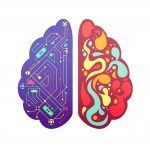How Accurate are Our Memories?
If the brain is functioning well, one can often recall some of the details of their past experiences so as to produce new experiences that are similar to the original. When one remembers an idea that was previously stored in memory, it usually has a purported truth value associated with it. For example, memory of an experience that one had when they were young is stored in memory as a purported experience while memory of a fictional idea or one that was made up, such as a fantasy, is not stored as purported truth. The problem is that the brain is not perfect, so even if one’s brain is working properly then they would probably only be able to accurately remember past experiences and accurately tell what memories are true or false most of the time. Remembering information stored in one’s memory does not produce new knowledge by itself because the only product of this is something that is already known, but the mind can use reason to infer new knowledge from existing memories.
Knowledge consists of one’s beliefs, including one’s memories that are stored in the mind as purported truth and the ideas that one is currently thinking about that are purported to be true and that might not be stored in one’s memory just yet. The ideas that one has in mind that are the product of very recent perception are more likely to be true than most memories that one has. Memories do have a tendency to be unreliable in many situations. Despite this, the most basic and general facts that one knows from memory can be just as certain as if one were currently perceiving them. This includes basic things such as one’s name and where one lived as a child and where one went to school, for example. These facts are not certain for everyone, but for most people they are because it just would not make sense to think that one could be completely wrong about these basic facts of their life. If one begins to doubt these basic facts that are so obvious to them and so central to their very identity, then this would seem to imply that they don’t even have the ability to have reasonable and intelligent thoughts, which is absurd.
While the basic and general facts in one’s memory can be utterly certain if they are recalled into one’s active thoughts, this is not true for the details in one’s memory. If any living person were to write down every detail that they can remember from their own past, including what they said and whom they said it to, what they did and why, what they saw and what they heard and when, the chance is near zero that this person would be 100% accurate in their recollection of these details. Human memory is not perfect, so most memories inevitably come with some level of uncertainty. Despite this, any memory that one recalls that seems clear and unambiguous is epistemically justified. Recalling a belief from memory and continuing to believe in it with active thoughts is never an act of blind faith because the memory itself is immediately accessible evidence. As will be explained in more detail later, blind faith is the act of believing in a baseless claim despite the complete lack of evidence. When one recalls a memory, this is never a baseless claim, hence it is not an act of blind faith for one to accept that this memory is accurate.
What are your thoughts? Use the comments feature to join the conversation.
Image courtesy of Unsplash.com









